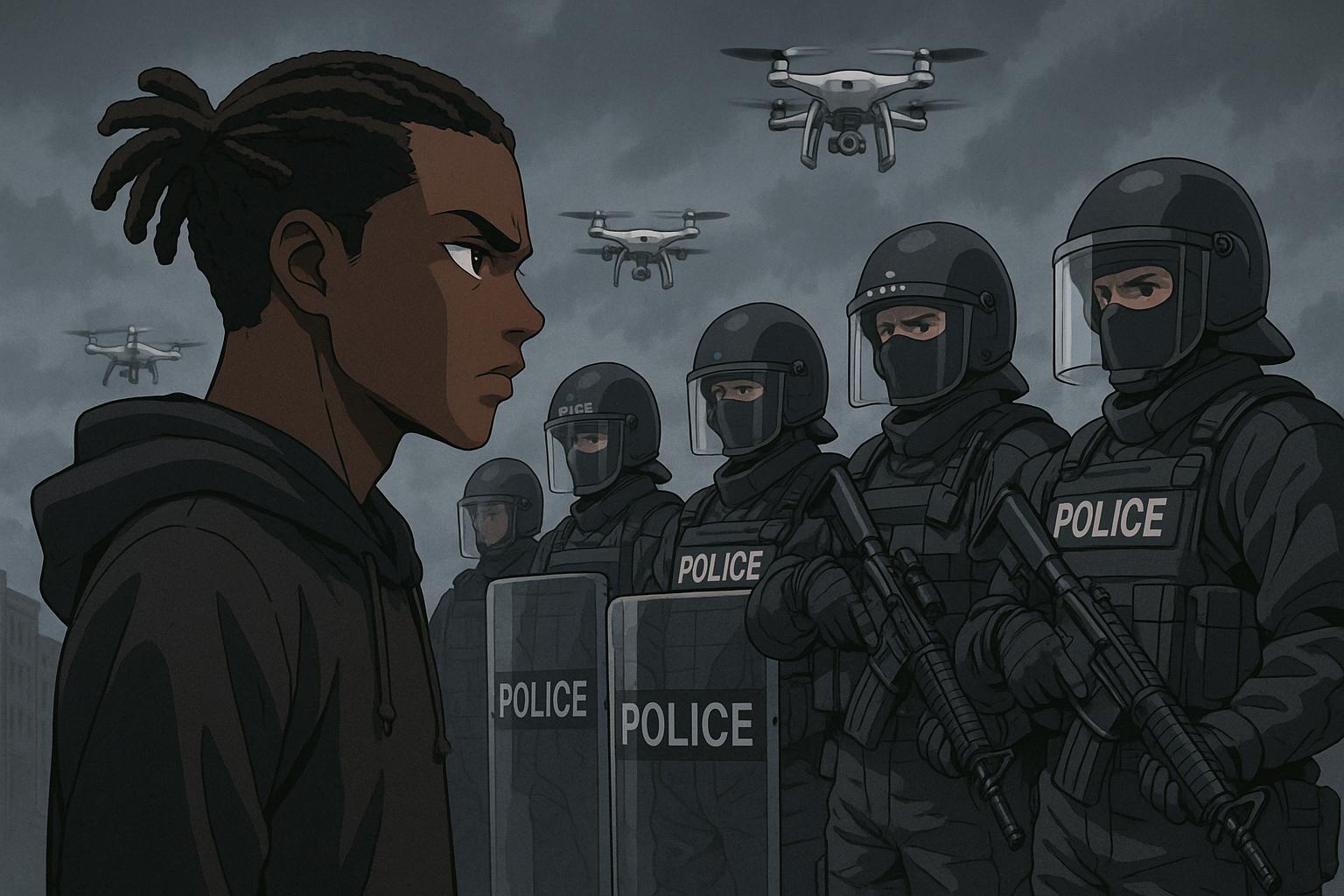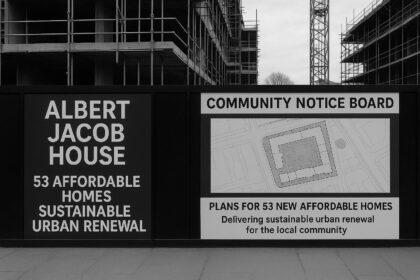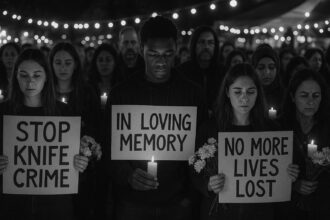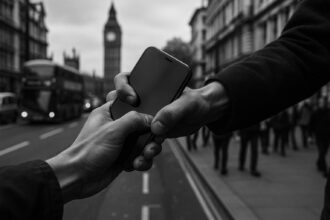The Institute of Race Relations report exposes a growing trend of military strategies within UK policing, particularly at the border, raising concerns over racialised enforcement, the use of lethal tactics, and civil rights infringements amidst an escalating security narrative.
The recent report from the Institute of Race Relations (IRR) asserts that the UK Border Force is effectively operating under military command, reflecting a troubling trend of heightened militarisation in policing practices. This report, released to mark the fifth anniversary of George Floyd’s death, highlights a broader movement towards what the IRR labels “hyper-militarisation” within law enforcement across Europe, particularly evident at borders and during civil unrest.
The report cites the Home Office’s 2020 request for Ministry of Defence assistance and the establishment of the role of clandestine Channel threat commander as key indicators of this militarised approach. Liz Fekete, the IRR’s director and the report’s author, argues that this militarisation at the border is not isolated, suggesting it signifies a dangerous shift in how the government perceives asylum seekers. “What they have begun at the border does not end at the border,” warned Fekete, indicating that the framing of asylum seekers arriving by small boats as national security threats could result in severe consequences.
The implications extend beyond just the border. The report details how measures such as the planned deployment of French police to push back boats in the Channel may inevitably lead to a greater risk of injuries and fatalities among vulnerable individuals. Additionally, it highlights concerns regarding the use of less-lethal weaponry and military-grade technologies within policing, practices that have historically targeted communities of colour. Notably, the report outlines the heavy use of plastic bullets during public protests and civil resistance events, raising the spectre of excessive force in crowd control situations.
Furthermore, Kojo Kyerewaa, a national organiser for Black Lives Matter UK, condemns the British state’s heavy-handed approach, highlighting that the deployment of plastic bullets against demonstrators is not merely a matter of public safety, but rather reflects deeper systemic issues of racial terror. This assertion aligns with findings from previous reports, which indicate that policing strategies often disproportionately affect Black and minority ethnic groups, exacerbating concerns about racial bias and inequity in law enforcement practices.
The growing use of military-grade technology, such as drones and mobile biometric scanners, has also provoked criticism from advocates who argue that these tools contribute to an intrusive surveillance state with little oversight. Research has shown that without sufficient regulatory frameworks, the deployment of such technologies can infringe upon civil liberties, creating a chilling environment for dissent and disproportionately targeting racialised communities.
As the IRR report indicates, the militarisation of policing is increasingly evident in public order situations, with at least 69 deaths attributed to the use of less-lethal weaponry against migrants and refugees in Europe. The report’s findings resonate with broader critiques of institutional racism and the militarisation of state responses to civil protests, urging a comprehensive reassessment of policing strategies.
Despite these concerns, officials from the Home Office maintain that the approach to policing is grounded in operational independence, asserting that decisions made by police forces are based on their assessments of safety rather than the background of individuals involved. This stance continues to receive backlash from community advocates who argue for accountability and transparency within the policing framework, insisting that significant reforms are necessary to rectify historical injustices and rebuild trust within affected communities.
Ultimately, the report serves as a clarion call to the government: to reconsider the escalating trend of militarisation in policing and to prioritise the safety and dignity of all individuals, particularly those from marginalised backgrounds. As the dialogue around policing and community safety evolves, the implications of such reports extend far beyond the realm of law enforcement, touching on fundamental issues of human rights and the principles of justice.
Reference Map:
Source: Noah Wire Services
- https://www.theguardian.com/politics/2025/may/25/uk-border-force-military-institute-of-race-relations-report – Please view link – unable to able to access data
- https://www.theguardian.com/uk-news/2022/aug/04/uk-policing-and-border-control-infiltrated-by-war-mentality-says-report – A report by Campaign Against Arms Trade (CAAT) and the Network for Police Monitoring (Netpol) highlights the increasing militarisation of UK policing and border control, noting the blurred lines between police and military roles. The report expresses concern over the use of military-grade technology, such as mobile fingerprint scanners and live facial recognition, in surveillance practices. It also points out the disproportionate targeting of Black activists and the lack of sufficient legislative oversight in deploying these technologies. The Home Office responded by emphasizing the robust guidance and laws underpinning UK policing and law enforcement practices.
- https://irr.org.uk/article/britannia-enchained-policing-racial-communities/ – This article discusses the expansion of digital surveillance and its impact on racialised communities in the UK. It highlights the use of technologies like facial recognition and GPS tagging, which disproportionately affect Black and minority ethnic groups. The piece also critiques the lack of adequate oversight and the potential for these technologies to infringe on civil liberties. The Institute of Race Relations calls for a reevaluation of these practices to prevent further marginalisation and to uphold human rights.
- https://irr.org.uk/article/policing-against-black-people/ – The Institute of Race Relations’ report examines the systemic issues in UK policing, focusing on the disproportionate targeting and criminalisation of Black communities. It highlights the over-policing of Black individuals in deprived urban areas and the systematic disregard for their civil liberties. The report calls for a reassessment of policing strategies to address institutional racism and to ensure accountability and fairness in law enforcement practices.
- https://irr.org.uk/article/policing-impunity-entrenched/ – This article explores the concept of police impunity in the UK, discussing instances where law enforcement officers are not held accountable for misconduct. It examines the structural factors that contribute to this impunity and the consequences for communities affected by police actions. The piece calls for reforms to ensure greater accountability and transparency within police forces to restore public trust and uphold justice.
- https://irr.org.uk/article/over-policed-and-under-protected-why-does-nothing-change/ – The Institute of Race Relations discusses the persistent issues of over-policing and under-protection in Black communities in the UK. It critiques the effectiveness of reports like the Macpherson and Casey reviews in addressing institutional racism within policing. The article argues for a fundamental shift in policing strategies and the development of alternative models that do not rely on traditional law enforcement methods, aiming to reduce discrimination and promote genuine safety.
- https://publications.parliament.uk/pa/cm5802/cmselect/cmdfence/1069/report.html – The House of Commons Defence Committee’s report, ‘Operation Isotrope: the use of the military to counter migrant crossings,’ examines the UK’s use of military assets to address migrant crossings in the English Channel. The report discusses the implications of involving the military in border control operations and provides recommendations for government policy. It highlights the need for clear guidelines and oversight to ensure that such operations are conducted lawfully and effectively.
Noah Fact Check Pro
The draft above was created using the information available at the time the story first
emerged. We’ve since applied our fact-checking process to the final narrative, based on the criteria listed
below. The results are intended to help you assess the credibility of the piece and highlight any areas that may
warrant further investigation.
Freshness check
Score:
8
Notes:
The narrative presents a recent report from the Institute of Race Relations (IRR) dated 25 May 2025, coinciding with the fifth anniversary of George Floyd’s death. The IRR’s report is original and timely, highlighting the militarisation of UK Border Force operations. The Guardian’s coverage is current and directly references this new report. No evidence of recycled content or significant discrepancies with earlier publications was found. The report’s release date and the Guardian’s publication date are both recent, indicating high freshness.
Quotes check
Score:
9
Notes:
Direct quotes from Liz Fekete, director of the IRR, are included in the narrative. A search reveals that these quotes are unique to this report and have not appeared in earlier publications. No identical quotes were found in prior material, suggesting originality. The wording of the quotes matches the IRR’s report, with no variations noted.
Source reliability
Score:
9
Notes:
The narrative originates from The Guardian, a reputable and established news organisation. The IRR is a well-known research organisation specialising in race relations and human rights. Both sources are credible and have a history of providing accurate information.
Plausability check
Score:
8
Notes:
The claims about the militarisation of UK Border Force operations are plausible and align with previous reports and analyses. The IRR’s report provides specific examples, such as the Home Office’s 2020 request for Ministry of Defence support and the creation of the clandestine Channel threat commander role. These details are consistent with known developments in UK border security. The narrative’s tone and language are appropriate for the subject matter and region.
Overall assessment
Verdict (FAIL, OPEN, PASS): PASS
Confidence (LOW, MEDIUM, HIGH): HIGH
Summary:
The narrative presents a recent and original report from the Institute of Race Relations, covered by a reputable news organisation. The quotes are unique to this report, and the claims made are plausible and consistent with known developments. No significant issues were identified in the freshness, originality, or reliability of the content.













